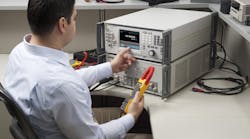Advanced education and ongoing tech support helps wring maximum benefit out of HALT and HASS test programs for companies focused on product reliability and rapid time to market.
By Jeffrey Hale
Knowledge is power, said Francis Bacon. Such wisdom acts as strong consolation to any test engineer tasked with initiating a HALT (Highly Accelerated Life Testing) or HASS (Highly Accelerated Stress Screening) program at the request of management.
With proper support tools, such as training programs, application-specific consultations, on-line technical aids, and a local presence of support personnel, vendors of HALT and HASS equipment are filling the knowledge gap between the theory of accelerated testing and actual implementation of such procedures. In this manner, HALT and HASS fulfill their promise of empowering manufacturers with the ability to bring products to market quickly, and with reduced design and warranty costs.
HALT and HASS have now been generally recognized as the fastest and most effective new standards for design verification testing (DVT) and production screenings, respectively. Yet applying the theory requires expertise in determining which equipment and testing procedures are best for a particular application because these disciplines cover an extremely broad range of industries, including military and aerospace, electronics, medical devices, and automotive.
Yet, few test engineers enjoy the luxury of open-ended “charge numbers”-whether credited to a specific program or simply overhead-to become subject experts in HALT and HASS. Such expenses cut into profit margins. Driven by the exigencies of their own program schedules, even fewer possesses the spare time to indulge in extensive trial and error exercises to figure out how to implement accelerated testing techniques. In most cases, customer-driven timetables do not allow the leeway of on-the-job training.
“We were asked by Airbus to achieve “product maturity” at the entry into service, and it was my job to introduce HALT and HASS to help us to achieve the near-zero return rate, including infant failures, this customer was looking for,” recalls Daniel Goulet, test strategy and product maturity manager in the Industrial Operation Division of Thales-Aerospace-a division of Thales, one of the world’s largest professional electronics companies serving the defense, aerospace, and security markets from its headquarters in France.
“Even though I was totally in charge of this testing, I initially lacked a full understanding of what was called for,” Goulet continues. “For example, in writing the test specifications we encountered problems in deciding at what level [line-replaceable unit, circuit card assembly, or component] the HASS testing needed to be applied. Conducting multiple, possibly unnecessary, tests would have had a great impact on production costs and time cycle.”
Correctly administering HALT and HASS requires much more than immediate access to a testing chamber. This is where expert vendors step in to guide engineers in making accelerated testing pay-off for the organization.
“Any kind of calculation of return on equity is going to involve some sort of judgment which should be backed by experience on what failures are going to be relevant,” says Ed Kyser, consultant and author of several articles on accelerated stress testing, and holder of seven U.S. patents. Kyser’s company, Reliability Economics in Los Altos, Calif., provides assessment and economic analysis of reliability- and quality-improvements programs.
“I know how to work through the numbers to determine if, and how, a particular chamber can pay off,” continues Kyser. “Because of my broad range of experience I can also make relevant comments on what failures are going to be ones that should be chased to root cause. Through me, companies like QualMark offer not just a chamber, but the service and expertise to go along with it. They employ me to provide this advice as an added value.” QualMark Corp. in Denver provides accelerated testing systems.
“The QualMark test facilities see a broad range of products, so they can contribute a wealth of information and data that’s very useful to any kind of company that’s interested in buying their own test chambers,” notes Kyser.
One productivity tool improved by application-specific knowledge and that supports what really seems to account for the increasing success of HALT and HASS programs is a heavy emphasis on test. In this manner, experienced engineers help integrate the efficiency and effectiveness of existing protocols and procedures at the customer site with the new accelerated testing programs.
“QualMark helped us by providing a methodology to analyze and search for the best solution,” Goulet says. “Of course they did not write the test specifications, but they helped us define them.”
“I used to run tests in the QualMark lab before we got our own chamber, so their test culture affected the way I designed my tests. Their staff gave us an understanding of how to do HALT testing, and also how to document the test results,” says Brian Dahl, environmental testing engineer at Agilent Technologies Inc. in Palo Alto, Calif.
To ensure continued optimization of HALT and HASS chambers, some test-equipment vendors continue to assist the customer long after the initial sale. In this manner, neither support nor the “knowledge pipeline” come to an abrupt end, and companies can continue to cost-effectively implement accelerated reliability programs.
“When I finally began to understand HALT and HASS, I established contact with two big suppliers of accelerated testing equipment. Of course, there were some positive points on either side, but the most important differentiation for me, was local support,” Goulet comments. “We couldn’t afford to wait for support to come from another country, which would have been the case had we not opted for QualMark. When support is fast, it can save us time and money because there is little or no break in the production flow. Some of our chambers run 20 hours a day.”
Particularly with HALT and HASS chambers, support ideally comes from technicians who are well versed in the unique conditions of the accelerated testing environment.
“We have a third-party contractor service our regular testing chambers here at Agilent, but this contractor won’t touch our HALT chambers,” observes Dahl. “We have the OEM vendor of the accelerated chambers come out and service them. It is a big plus when the manufacturer sends its own people out to work on the equipment.”
“Our decision to go with a particular accelerated-testing vendor was based on the level of support,” Goulet says. “QualMark delivered that. Each time I have had some difficulty, I call them, I discuss the issue with them, and we arrive at a solution. For me, that is the most important thing that makes this all work.”
“Correctly applied with the right knowledge, HALT and HASS works to the benefit of the customer because they will end up with a better product that works in the field and generates additional business down the line,” Kyser says.
Jeffrey Hale is vice president of sales and marketing at Qualmark Corp. in Denver. He can be reached by phone at 303-876-0614 or by e-mail: [email protected].


